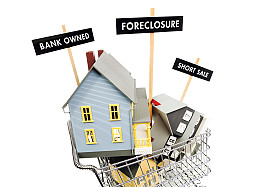Mortgage Advice
Mortgages
Understanding Mortgages: What is Foreclosure?
by Amy Lillard
(7/11/2012) In the midst of one of the most uncertain real estate markets in history, it’s more important than ever to be informed. In a continuing series, we take a look at some of the most pressing questions about mortgages, refinancing, home equity, and other real estate options available to you.

Foreclosure is a word that strikes fear in many homeowners and industry experts alike. But for those unfamiliar, it also causes confusion and curiosity.
Overall, foreclosure is a legal process that begins when a borrower misses payments. Lenders will formally request payment, and must either receive it or make another arrangement. If payment is not received, the lender will retake ownership of the home and/or sell the property in order to recoup the value of the loan.
Foreclosures negatively impact nearly all players involved. Borrowers whose home goes into foreclosure can receive a major decrease in credit score of over 200 points. Since foreclosure indicates difficulty in meeting debt obligations, applications for future loans, credit cards, and even jobs can be reconsidered. The effects of foreclosure on a credit score and/or history lasts for 7 years.
Foreclosures can be a burden for lenders as well, who may lose a portion of the loan in the process. And when it comes to the overall housing market, foreclosures can drag down the value of surrounding homes, hurting neighborhoods and adding to downward price pressure.
Foreclosures follow a few key stages. A formal Notice of Default is the first step, notifying the borrower of 3-6 months of missed payments. If the loan is not brought current within three months of this notice, a foreclosure sale date is set. A formal Notice of Sale will be sent to the homeowner, and posted on the property.
On the sale date, foreclosed homes are typically sold at auction, usually for less than the home value. Proceeds go to the lender first, other lien-holders next (contractors or secondary lenders), and then the borrower.
Acknowledging the detrimental effect of foreclosures, a number of federal and private programs have been announced to help borrowers who are facing the process. In addition to the Obama Administration’s Making Home Affordable programs, Bank of America has become the first prominent lender to offer principal reductions and other options.
For additional reading:
Avoiding Foreclosure: http://www.getsmart.com/loan-resources/Mortgages/How-to-Avoid-Foreclosure.aspxLearn the Foreclosure Law for Your State:
http://www.biggerpockets.com/foreclosurelaw/index.html
Refinance at Today's Low Rates!
Follow the link to continue reading the related articles.
Understanding Mortgages: What is Delinquency?
Understanding Mortgages: What is a Short Sale?
Mortgage modification savings help create better borrowers
Federal regulators order mortgage servicers not to violate military servicemembers' homeowner rights
Foreclosures and Home Sales: A Bigger Piece of the Pie
Mortgage delinquency rate falls for first time in two quarters
Shorts sales streamlined to head off 'underwater' mortgage foreclosures
Fannie Mae & Jumbo Mortgage Rates
Just One Click! = Current Rate Chart


